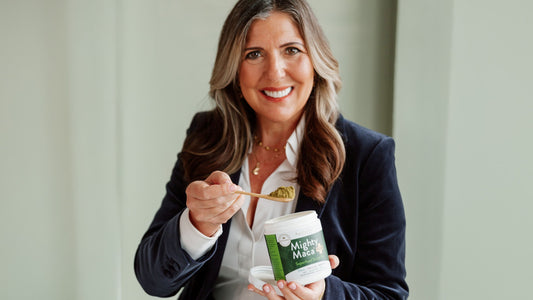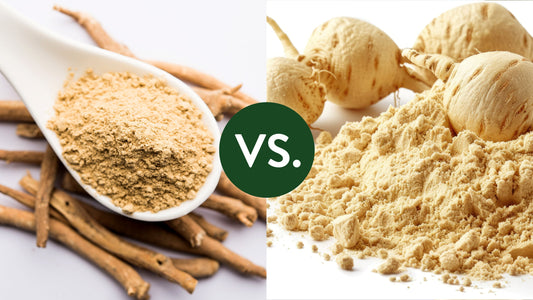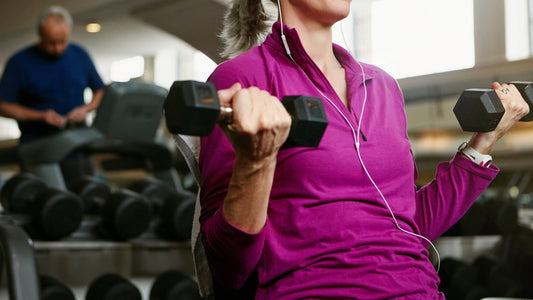Hands up if you’re going through menopause and you’re wondering when it’s all finally going to end. Well, I’ve got some great news for you, because menopause, in fact, comes in phases. Which means you can look at the different stages of menopause to see where you’re at in the process and how to feel your best during each phase.
I love to compare the menopausal transition to a caterpillar cocooning and emerging, yes, with struggle, into the butterfly. This new chapter of your life can be one of beauty. One where you focus on things that feed your spirit rather than tending to everyone else’s needs for a change.
Truthfully, this phase of life can be an empowering transition into a time of what I refer to as “energized enlightenment” — if that’s what you choose, because you are in charge of your life! It’s important to remember that your body was beautifully and wonderfully made to go through this transformation. Menopause is a fantastic opportunity to focus on enlivening the spirit that glows within each of us.
So what exactly does this transformation look like, step-by-step? Well, the stages of menopause include the late reproductive years, perimenopause, menopause, and post-menopause.
Let’s take a look at the entire journey, talk about what you can expect, and things you can do to ease the transition. Because I promise, you don’t have to suffer through this part of your life.
Stages Of Menopause: The Complete Journey
First, we have to talk about the definition of menopause. Menopause is defined as the day your period has completely stopped for one whole year. After that one-year anniversary, you are officially considered post-menopausal. (1)
In the years leading up to this event, you are perimenopausal. In the years after this event, you are post-menopausal. However, most women simply refer to this whole time period as “menopause.”
Let’s go through the stages of menopause, in order.
First Stage Of Menopause
During the first stage of menopause, you’re considered in the late reproductive phase of your life. You’ll likely still get your period. It’s usually pretty regular, but your ovarian reserve is dwindling. While there are always exceptions, this typically starts to happen around age 35-45.
During this time, you probably won’t even realize that your hormones and neurotransmitters are beginning to subtly shift.
The best thing you can do to support your body during this time is to make sure you’re getting enough protein in your diet and eating the Keto-Green way (plenty of alkalizing veggies and low in simple carbs).
Your best girlfriend during this stage is my Keto-Green Protein Shake. It’s the tastiest and easiest way to make sure you’re getting enough protein and it supports your gut health with a vegan, gluten-free, soy-free, non-GMO formula.
Second Stage of Menopause
In the second phase of menopause, you’re in perimenopause. This is sometimes also referred to as the menopausal transition. During your perimenopause phase, your period may become irregular and your ovarian reserve is officially considered low.
As you continue into the perimenopausal years, your cycles will become further apart. You will have fewer eggs in your ovaries. And your follicle-stimulating hormone (FSH) levels will increase. Measuring your FSH levels is one of the ways your doctor may confirm that you’re officially in menopause. (2)
This is when you will likely start to experience what we often call the symptoms of menopause. Think brain fog, fatigue, weight gain, hot flashes, headaches, dry and thinning vaginal tissues. For a thorough list of symptoms, keep reading.
Most women in their 40s (that have not undergone a hysterectomy or experienced early menopause) are in perimenopause.
Once your period clearly stops coming regularly, and it’s showing up every 60 days or less, you’re now considered in the late menopausal transition or late perimenopause. During this time, your progesterone and estrogen levels will begin to drop.
- During this stage, your body needs more support. The most important thing to do right now is stick with the Keto-Green lifestyle and add in support for your adrenals — so they prioritize hormone production and keep you feeling energetic.
Your best girlfriend right now? My Mighty Maca Plus drink mix. This delicious formula gives you the energy you desperately need…and it even helps keep mood disorders and hot flashes at bay, too.
Third Stage of Menopause
The third stage of menopause is actual menopause. This is technically one day. The day you haven’t gotten a period for 12 whole months. If this event happens over the age of 45, that’s considered typical. The median age for menopause is 51.
Some women may lose their periods before age 45, but that may be caused by something other than menopause. You definitely want to check with your doctor if that’s happened to you.
Fourth Stage of Menopause
In the final phase of menopause, you’re now considered postmenopausal. The beginning of this stage is called early postmenopause. For some women, their vasomotor symptoms (hot flashes and night sweats) begin to subside at this point. But for others, they battle symptoms for a full decade into postmenopause.
After about 3-6 years postmenopause, you transition into late postmenopause. During this time, you may see menopausal symptoms begin to lessen, but low estrogen levels also put you at greater risk for things like osteoporosis and heart disease.
- Now that you’re postmenopausal, it’s time to meet your new best girlfriends: Balance + Julva. This dynamic duo helps support dry and thinning tissues down there and gives your body a serious boost of natural progesterone and pregnenolone.
Perimenopause Vs Menopause
Technically, perimenopause is the time period leading up to menopause — the final years of your reproductive phase of life. Perimenopause means “around menopause.” A lot of times, we all use the term “menopause” as a catch-all phrase to include perimenopause, menopause, and postmenopause.
At What Age Does Menopause Start?
Most women tend to experience menopause (the official end of their period) at around age 51. But early menopause symptoms and perimenopause can begin in your 30s. This is when subtle changes to your hormone levels start to cause menopausal symptoms like brain fog, fatigue, weight gain, and headaches.
Menopause Early Symptoms
During your perimenopausal and menopausal transition, you may experience a whole host of menopause’s early symptoms.
Here’s a list of some of the most common ones:
- Acne
- Anxiety
- Fatigue
- Nausea
- Brain fog
- Insomnia
- Joint pain
- Low libido
- Hot flashes
- Depression
- Headaches
- Weight gain
- Night sweats
- Mood swings
- Vaginal Dryness
- Heart palpitations
- Breast tenderness
Many of these symptoms can indicate dozens of other conditions. And some women start to experience them as early as age 35 when progesterone starts to drop. This means that sometimes when you’re younger, you may not realize your symptoms are caused by the onset of perimenopause.
Does Menopause Cause Weight Gain?
Does menopause cause weight gain? Well, for a lot of women, yes indeed it does. In fact, one of the top complaints I hear from menopausal and perimenopausal women is that they are gaining weight.
It seems like no matter what you do, your “menopause belly” keeps expanding. And the bloating just won’t quit.
This is due to changes in your hormones. Those fluctuating hormone levels are working against you to put weight on — especially in your midsection. Add in poor sleep quality, night sweats, and insomnia…and you’re less likely to feel like exercising the next day too. (3,4) All of these factors combine to make weight gain seem like an inevitable part of menopause.
So — if you’re experiencing menopausal weight gain, know you’re not alone. But also know that losing weight in menopause is definitely possible.
In fact, women all over the world have used my signature Keto-Green diet to get rid of menopause belly fat, menopausal bloating, and lose weight during menopause. The Keto-Green diet combines low-carb eating with plenty of alkalizing vegetables and greens. It really is the best menopause diet to lose weight.
Want a quick diet jumpstart? Grab my Keto-Green cheatsheet (complete with recipes!) and get started losing weight and thriving.
Can Menopause Cause Anxiety?
Unfortunately, for many women, anxiety and menopause go hand-in-hand. This is because as you age, levels of neurotransmitters like gamma-aminobutyric acid (GABA) and serotonin are affected. (5,6)
Your waning estrogen and progesterone levels affect your mood too. During perimenopause, you may find that mood swings and depression can also crop up during this stage of menopause. You may feel irritable and angry one minute and sad the next.
For menopausal anxiety, I always turn to my Mighty Maca® Plus and Balance Cream to help support progesterone levels.
Menopause Vaginal Dryness
Another one of those very common and very frustrating symptoms of menopause is vulvovaginal dryness.
As you progress through the stages of menopause, you’ll find that as estrogen levels drop, vaginal dryness increases. Not only is this extremely uncomfortable, but it also makes sex painful. Studies show women feel embarrassed talking about this with their doctors — so they wait to get treatment or they just suffer through. (7) I recently developed a beautiful, clean, and effective aloe and water-based lubricant, Velvé. I designed it to provide immediate, short-term relief—and pleasure—during intercourse and other intimate activities. It’s especially formulated for menopausal and postmenopausal women. It’s a great companion product to Julva in addressing your intimate care needs.
There are menopause dryness natural remedies — like my Julva® vaginal tissue rejuvenator that can help restore moisture and reignite your desire in the bedroom at the same time.
Julva® contains Dehydroepiandrosterone (DHEA). DHEA for menopause is one of my secret weapons. I’ve been using it in my practice for years to help women get their sexy back and put a stop to those horrible vulvovaginal struggles like dryness, thinning tissues, and leaking.
How Long Does Menopause Last?
How long can menopause last? In truth, the transition from perimenopause into menopause can be a rather long journey — ranging from 7-14 years. While the median age for menopause is 51, some women begin experiencing perimenopausal symptoms in their 30s. (8)
Stages Of Menopause: What Signals The End Of Menopause?
So, exactly when does menopause end? How do you know when the menopause is over? Menopause is technically ‘over’ when you haven’t gotten your period for exactly one year.
That means you don’t get your period after menopause. And you can’t get pregnant after menopause.
For a lot of women, this ushers in a new, more sexually confident era. After all, if you can’t get pregnant anymore, that removes one of the potential risks of sex, doesn’t it? This makes menopause the perfect time to infuse plenty of positivity and pleasure into your life.
Menopause Self-Care and Celebration
Menopause can absolutely be a time of joy and fulfillment. It can be a time to try out all of the things you’ve always wanted to do, but never had the time.
I always think about my client Sylvie, who decided to finally fulfill her lifelong dream of taking flying lessons after menopause. She’d been a flight attendant for many years and was ready to step into a bigger, more daring version of herself.
With kids out of the nest or soon to be leaving, you have the opportunity to pursue passion in your work, your play, and your relationships.
Ultimately, how you experience the stages of menopause all depends on the choices you make and the attitude you embrace towards this phase of life. There’s a whole new path opening up ahead of you. Enjoy the journey.
It is my mission to help women conquer the suffering and stereotypes of menopause so they may live a joyfully fulfilled life, loving others and with self-love, full of sexy feminine energy.
If that sounds like the life you want to live, be sure to check out my free Breeze Through Menopause 10-Day class to take control of your body, lose weight, and recover your love life.
Remember, you are worth it!
References
- https://www.ncbi.nlm.nih.gov/books/NBK507826/
- https://www.ncbi.nlm.nih.gov/pmc/articles/PMC4834516/
- https://www.ncbi.nlm.nih.gov/pmc/articles/PMC8569454/
- https://pubmed.ncbi.nlm.nih.gov/22978257/
- https://www.ncbi.nlm.nih.gov/pmc/articles/PMC10088347/#:~:text=Five%20out%20of%20the%20twenty,to%20the%20pre%2Dmenopausal%20women
- https://www.ncbi.nlm.nih.gov/pmc/articles/PMC3641149/
- https://www.ncbi.nlm.nih.gov/pmc/articles/PMC3735281/
- https://www.nia.nih.gov/health/what-menopause#:~:text=The%20menopausal%20transition%20most%20often,begins%2C%20and%20race%20and%20ethnicity.



